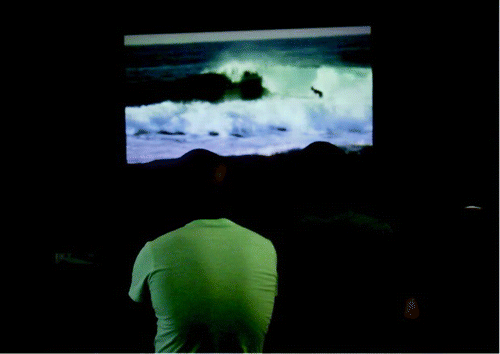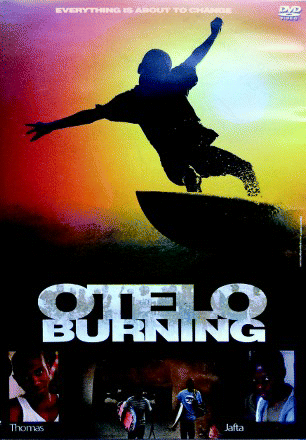This special section includes a series of conversations in relation to and with the South African film Otelo Burning (2011) (see ). This Zulu-language film with English subtitles presents young black men searching for freedom through surfing in late apartheid South Africa. The backdrop to their story is the late 1980s conflict in the Lamontville township of Durban between anti-apartheid ‘comrades’ and members of Inkatha supported by the apartheid ‘third-force’. Foregrounded is a coming-of-age drama that unfolds in the ocean until it too becomes tainted by conflict and competition, leading to tragedy at the moment of Nelson Mandela's release from prison on 11 February 1990.
Articles by Meg Samuelson and Glen Thompson place the film in dialogue with literary and photographic framings of its beach setting, a cultural history of surfing in South Africa that repeatedly configures itself in relation to Zulu identity, histories of exclusion in the form of beach apartheid, and surfing fiction and film from California and Australia. Three responses – by Bhekizizwe Peterson, Litheko Modisane and David Johnson – spotlight key features of the film, including its problematic presentation of black township life, the limitations and expansive possibilities of its renderings of personal and political freedom, and its partial allusions to the Shakespearian tragedy of Othello.
An interview with director-producer Sara Blecher and actor-waterman Sihle Xaba elaborates on the making and meanings of the film, with particular attention to the collaborative process that informs it. Based on workshops with local lifesavers from the Lamontville pool featured in the film, and black surfers from Umzumbe on the KwaZulu-Natal South Coast, the script was adapted throughout its filming by its actors – including Jafta Mambolo (‘Otelo’), Thomas Gumede (‘New Year’), Sihle Xaba (‘Mandla’), Tshepang Mohlomi (‘Ntwe’), Nolwazi Shange (‘Dezi’) and Motlatsi Mafatshe (‘Blade’). Much of the narrative is based on the personal experiences of Xaba, a champion bodyboarder and Durban lifesaver, although in the film he is cast in the role of antagonist.
Otelo Burning premiered on 21 July 2011 at the Durban International Film Festival in South Africa and its theatrical release in South African cinemas was on 11 May 2012. It was also released on DVD in 2012 and since January 2014 has become available through iTunes. This feature forms the apex of a constellation of films by Blecher, which focus on leisure and risk-taking among marginalised young black men and includes Surfing Soweto (2010), a documentary about train surfers on the route between township and city in Johannesburg, and the TV series Bay of Plenty (2007–2008), which absorbs many of the stories that surfaced in the Lamontville workshops. Xaba takes the lead role as a lifesaver in Bay of Plenty, supported by Gumede who plays the talented surfer ‘Chilliboy’.
Included as additional material in the on-line version of the journal (http://dx.doi.org/10.1080/13696815.2014.941341) is a series of textual, audio and video ‘sound bites’ that emerged from conversations we convened between Blecher and Xaba and three audiences: students at the University of Cape Town (UCT) and participants in Isiqalo's Waves for Change programme at Khayelitsha and Muizenberg (). Some of the UCT students were studying the film in a seminar titled ‘Subjects at Sea’ that otherwise explored literary and filmic representations of sailors and surfers from Herman Charles Melville and Joseph Conrad through to Amitav Ghosh, Kem Nunn, Tim Winton and John Milius. Waves for Change is a non-profit programme that includes surfing as part of its leadership and youth development work among marginalised black youth living in townships near the beach. Waves for Change is not alone in its endeavours to use surfing as a developmental and therapeutic activity. Surfing development in South Africa is part of a national sports policy to effect social transformation. At the local level, development surfing programmes include the Umthombo Street Children in Durban and the Palama Metsi Surfing Development Academy, which operates in under-resourced communities of coastal surf centres – namely, Muizenberg, Elands Bay and Coffee Bay.
Figure 2. Watching Otelo Burning at Esengweni High School, Khayelitsha, August 2013. Still from recording by Greg Bakker.

We were particularly interested in the various responses that the film elicited even within the circumscribed space of Cape Town and its surrounds. Audiences that approached it as students plumbing the depths of its meanings or as young black developmental surfers in search of role models engaged with it in quite different terms and summoned from their interlocutors – Blecher and Xaba – diverse interpretations and contextualisations. Language, too, is a factor here as some audiences access the nuances of the Zulu dialogue and voice-over to various degrees while others – including the two editors of this special section – approach it exclusively through its English subtitles. In addition to South African film scholars and (black) surfers, the film has gained particular traction with audiences at international surfing film festivals, where it sates a growing appetite for ‘indigenous’ surfing stories. It has also been well-received by African-American audiences at independent film festivals.Footnote1
Otelo Burning relates freedom to the act of surfing waves in the ocean. Although presented as more individualistically redemptive (and hedonistic) than socially transformative, surfing is presented as a metaphor for changing subjectivities. At the same time, it extends the hegemony of shortboard stand-up surfing to the exclusion of bodyboarding, a wave-riding activity where the surfer lies down on a board, which has been instrumental in the history of black access to ocean sports and in Xaba's own experiences. Due to these histories and practices, surfing and bodyboarding as ways of riding waves are used interchangeably in the interview despite Otelo Burning's focus only on the modern surfing habitus. This limitation in the film fits within the wider popular cultural appeal of surfing as promoted by the global surfing cultural industries and associated professional surfing culture.
This special section hopes to encourage further research on the circulation of Otelo Burning, the publics it convenes, and the layered address it extends to Zulu and English-speaking audiences. Such enquiries are germane, of course. The major subtext of this film concerns questions of access and exclusion, and of the meanings of freedom for black youth (particularly men) on the cusp of a new nation.
Sound Bites: Compiled and Edited by Meg Samuelson and Glen Thompson
Download PDF (357.4 KB)Khayelitsha Waves for Change programme participants offer Sihle Xaba a vote of thanks.
Download MP4 Video (9.7 MB)A surfer from the Khayelitsha Waves for Change programme thanks Sihle Xaba for his encouragement.
Download MP4 Video (6.3 MB)Otel's peak experience on a wave is witnessed by Dezi on the beach in Otelo Burning. This pivotal scene in the development of his surfing talent is watched by black youth who first began surfing at Monwabisi Beach near Khayelitsha in late 2012.
Download MP4 Video (3.2 MB)In this beach house scene from Otelo Burning, New Year displays his ignorance of surfing by putting on a wetsuit back-to-front. The black surfers from Khayelitsha watching the film find this very amusing.
Download MP4 Video (1.2 MB)Sihle Xaba explains the therapeutic effects of the sport of surfing to black youth from Masiphumelele township, involved in the Waves for Change programme and surf at Muizenberg Beach.
Download MP3 Audio (849.5 KB)Acknowledgements
For enabling these opening enquiries into the film, we offer our grateful thanks to Sara Blecher and Sihle Xaba who engaged with great generosity in the various conversations we convened; Tim Conibear and Waves for Change (coaches and participants), Esangweni Secondary High School (Principle Mvuyisi Mbotshelwa and teacher Mr Sizani), Knead Muizenberg, the Department of English at the University of Cape Town, the Department of History at Stellenbosch University, and the Centre for Film and Media Studies at the University of Cape Town, in particular Ian Rijsdijk, who facilitated these conversations; the National Research Foundation of South Africa and Deputy Vice-Chancellor Crain Soudien of the University of Cape Town, who provided funding support; Greg Bakker, who filmed the screening and Q&A at Esangweni Secondary High School; Paballo Chauke, Hilda Phatswana, Christine Emmett, and Kerry Chappell, who provided assistance with translation, transcription and video editing; the UCT English department students in the 2013 ‘Subjects at Sea’ seminar; and editor Carli Coetzee, who suggested this project to us.
Notes
1 For example, see the ‘Yes Black Men Can Surf’ interview with Sihle Xaba by Michelle Materre at the MIST Harlem, New York, 17 December 2012. http://www.youtube.com/watch?v=K0gGxlcsQzI [accessed on 26 July 2013].

